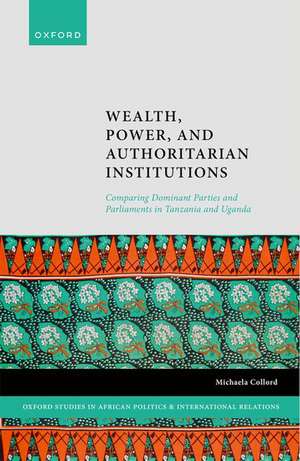Wealth, Power, and Authoritarian Institutions: Comparing Dominant Parties and Parliaments in Tanzania and Uganda: Oxford Studies in African Politics and International Relations
Autor Michaela Collorden Limba Engleză Hardback – 20 mai 2024
Preț: 647.64 lei
Preț vechi: 927.82 lei
-30% Nou
Puncte Express: 971
Preț estimativ în valută:
123.93€ • 129.13$ • 102.61£
123.93€ • 129.13$ • 102.61£
Carte disponibilă
Livrare economică 03-08 martie
Livrare express 27 februarie-05 martie pentru 148.22 lei
Preluare comenzi: 021 569.72.76
Specificații
ISBN-13: 9780192855183
ISBN-10: 0192855182
Pagini: 320
Dimensiuni: 160 x 240 x 22 mm
Greutate: 0.66 kg
Editura: OUP OXFORD
Colecția OUP Oxford
Seria Oxford Studies in African Politics and International Relations
Locul publicării:Oxford, United Kingdom
ISBN-10: 0192855182
Pagini: 320
Dimensiuni: 160 x 240 x 22 mm
Greutate: 0.66 kg
Editura: OUP OXFORD
Colecția OUP Oxford
Seria Oxford Studies in African Politics and International Relations
Locul publicării:Oxford, United Kingdom
Recenzii
Collord's work is at the cutting edge of a new generation of work on party-state formation in African studies. She argues that different trajectories of politicised accumulation produce varying patterns of ruling party development. Her operational indicators of ruling party strength and cohesion provide secure footholds for future comparative research in this critical domain. This book sets a very high standard.
A refreshing analysis of how wealth and power are distributed through state channels and elite contestations. Collord boldly combines political economy and institutional analysis to unpack the interplay between democracy and development. This is a must-read for those interested in the role of political parties, parliamentary institutions, and presidential changes in reshaping distributive politics across the authoritarian spectrum.
Michaela Collord makes a compelling contribution to our understanding of the complex political and economic dynamics that underpin authoritarian institutions. Using meticulous research on the legislatures in two dominant party regimes Uganda and Tanzania, the book advances a fascinating argument about the socio-economic foundations of elite power. She traces the implications of different patterns of wealth accumulation and how this diversity shapes political contestation and participation. The book sheds new light on the contemporary political economy of Tanzania and Uganda. It also provides a timely contribution to our understanding of the often-opaque political processes within authoritarian regimes and their wider implications for socioeconomic change.
Collord has produced a highly original and lucid account of power, parties, and legislatures in contemporary Africa. Employing a fresh and compelling theoretical perspective that is grounded in extensive empirical detail, Collord considers political party and legislative variation in Tanzania and Uganda. She argues persuasively that this institutional variation reflects differences in the distribution of power and wealth across authoritarian African regimes. Her book makes a valuable contribution to the literature on African political economy.
Creatively designed and meticulously researched, this refreshing study makes a compelling argument about the kinds of authoritarian institutions produced by different sorts of new elite coalitions in African polities.
A refreshing analysis of how wealth and power are distributed through state channels and elite contestations. Collord boldly combines political economy and institutional analysis to unpack the interplay between democracy and development. This is a must-read for those interested in the role of political parties, parliamentary institutions, and presidential changes in reshaping distributive politics across the authoritarian spectrum.
Michaela Collord makes a compelling contribution to our understanding of the complex political and economic dynamics that underpin authoritarian institutions. Using meticulous research on the legislatures in two dominant party regimes Uganda and Tanzania, the book advances a fascinating argument about the socio-economic foundations of elite power. She traces the implications of different patterns of wealth accumulation and how this diversity shapes political contestation and participation. The book sheds new light on the contemporary political economy of Tanzania and Uganda. It also provides a timely contribution to our understanding of the often-opaque political processes within authoritarian regimes and their wider implications for socioeconomic change.
Collord has produced a highly original and lucid account of power, parties, and legislatures in contemporary Africa. Employing a fresh and compelling theoretical perspective that is grounded in extensive empirical detail, Collord considers political party and legislative variation in Tanzania and Uganda. She argues persuasively that this institutional variation reflects differences in the distribution of power and wealth across authoritarian African regimes. Her book makes a valuable contribution to the literature on African political economy.
Creatively designed and meticulously researched, this refreshing study makes a compelling argument about the kinds of authoritarian institutions produced by different sorts of new elite coalitions in African polities.
Notă biografică
Michaela Collord is an Assistant Professor at the School of Politics and International Relations at the University of Nottingham. Her research focuses on the political economy of authoritarian rule and political institutions in developing countries. Her work also explores authoritarian strategies of urban political dominance and urban labour organizing. She has over a decade of experience working on politics and governance in East Africa and her research has been published in journals such as African Affairs, Democratization, Journal of Eastern African Studies, and Journal of Modern African Studies.













